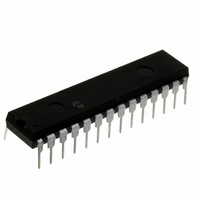PIC16F916-I/SP Microchip Technology, PIC16F916-I/SP Datasheet - Page 43

PIC16F916-I/SP
Manufacturer Part Number
PIC16F916-I/SP
Description
IC PIC MCU FLASH 8KX14 28SDIP
Manufacturer
Microchip Technology
Series
PIC® 16Fr
Datasheets
1.PIC16F616T-ISL.pdf
(8 pages)
2.PIC16F913-ISS.pdf
(330 pages)
3.PIC16F913-ISS.pdf
(8 pages)
4.PIC16F913-ISS.pdf
(34 pages)
5.PIC16F913-ISO.pdf
(274 pages)
Specifications of PIC16F916-I/SP
Program Memory Type
FLASH
Program Memory Size
14KB (8K x 14)
Package / Case
28-DIP (0.300", 7.62mm)
Core Processor
PIC
Core Size
8-Bit
Speed
20MHz
Connectivity
I²C, SPI, UART/USART
Peripherals
Brown-out Detect/Reset, LCD, POR, PWM, WDT
Number Of I /o
24
Eeprom Size
256 x 8
Ram Size
352 x 8
Voltage - Supply (vcc/vdd)
2 V ~ 5.5 V
Data Converters
A/D 5x10b
Oscillator Type
Internal
Operating Temperature
-40°C ~ 85°C
Processor Series
PIC16F
Core
PIC
Data Bus Width
8 bit
Data Ram Size
352 B
Interface Type
SSP/I2C/AUSART/SPI
Maximum Clock Frequency
20 MHz
Number Of Programmable I/os
24
Number Of Timers
3
Operating Supply Voltage
2 V to 5.5 V
Maximum Operating Temperature
+ 85 C
Mounting Style
Through Hole
3rd Party Development Tools
52715-96, 52716-328, 52717-734
Development Tools By Supplier
PG164130, DV164035, DV244005, DV164005, PG164120, ICE2000, DV164120
Minimum Operating Temperature
- 40 C
On-chip Adc
5-ch x 10-bit
Lead Free Status / RoHS Status
Lead free / RoHS Compliant
Lead Free Status / RoHS Status
Lead free / RoHS Compliant, Lead free / RoHS Compliant
Available stocks
Company
Part Number
Manufacturer
Quantity
Price
Company:
Part Number:
PIC16F916-I/SP
Manufacturer:
Microchip Technology
Quantity:
1 800
Company:
Part Number:
PIC16F916-I/SP
Manufacturer:
JST
Quantity:
4 300
- PIC16F616T-ISL PDF datasheet
- PIC16F913-ISS PDF datasheet #2
- PIC16F913-ISS PDF datasheet #3
- PIC16F913-ISS PDF datasheet #4
- PIC16F913-ISO PDF datasheet #5
- Current page: 43 of 274
- Download datasheet (5Mb)
FIGURE 3-7:
3.7
The Fail-Safe Clock Monitor (FSCM) is designed to
allow the device to continue to operate in the event of
an oscillator failure. The FSCM can detect oscillator
failure at any point after the device has exited a Reset
or Sleep condition and the Oscillator Start-up Timer
(OST) has expired.
FIGURE 3-8:
The FSCM function is enabled by setting the FCMEN
bit in the Configuration Word (CONFIG). It is applicable
to all external clock options (LP, XT, HS, EC or RC
modes).
In the event of an external clock failure, the FSCM will
set the OSFIF bit (PIR2<7>) and generate an oscillator
fail interrupt if the OSFIE bit (PIE2<7>) is set. The
device will then switch the system clock to the internal
oscillator. The system clock will continue to come from
the internal oscillator unless the external clock recovers
and the Fail-Safe condition is exited.
2004 Microchip Technology Inc.
Program Counter
LFINTOSC
Oscillator
System Clock
Fail-Safe Clock Monitor
Primary
INTOSC
Clock
OSC1
OSC2
÷ 64
TWO-SPEED START-UP
FSCM BLOCK DIAGRAM
Q1
0
Detector
Q2
Clock
Fail
1
T
T
OST
Q3
1022 1023
PC
Clock
Failure
Detected
Q4
Preliminary
Q1
The frequency of the internal oscillator will depend upon
the value contained in the IRCF bits (OSCCON<6:4>).
Upon entering the Fail-Safe condition, the OSTS bit
(OSCCON<3>) is automatically cleared to reflect that
the internal oscillator is active and the WDT is cleared.
The SCS bit (OSCCON<0>) is not updated. Enabling
FSCM does not affect the LTS bit.
The FSCM sample clock is generated by dividing the
INTOSC clock by 64. This will allow enough time
between FSCM sample clocks for a system clock edge
to occur. Figure 3-8 shows the FSCM block diagram.
On the rising edge of the sample clock, a monitoring
latch (CM = 0) will be cleared. On a falling edge of the
primary system clock, the monitoring latch will be set
(CM = 1). In the event that a falling edge of the sample
clock occurs, and the monitoring latch is not set, a clock
failure has been detected. The assigned internal
oscillator is enabled when FSCM is enabled as
reflected by the IRCF.
Q2
Note 1: Two-Speed
PC + 1
2: Primary clocks with a frequency ~488 Hz
enabled when the Fail-Safe Clock Monitor
mode is enabled.
will be considered failed by the FSCM. A
slow starting oscillator can cause an
FSCM interrupt.
Q3
PIC16F91X
Start-up
Q4
DS41250B-page 41
is
PC + 2
automatically
Q1
Related parts for PIC16F916-I/SP
Image
Part Number
Description
Manufacturer
Datasheet
Request
R

Part Number:
Description:
IC PIC MCU FLASH 8KX14 28SOIC
Manufacturer:
Microchip Technology
Datasheet:

Part Number:
Description:
IC PIC MCU FLASH 8KX14 28QFN
Manufacturer:
Microchip Technology
Datasheet:

Part Number:
Description:
IC PIC MCU FLASH 8KX14 28SSOP
Manufacturer:
Microchip Technology
Datasheet:

Part Number:
Description:
IC,MICROCONTROLLER,8-BIT,PIC CPU,CMOS,LLCC,28PIN,PLASTIC
Manufacturer:
Microchip Technology
Datasheet:

Part Number:
Description:
IC,MICROCONTROLLER,8-BIT,PIC CPU,CMOS,SOP,28PIN,PLASTIC
Manufacturer:
Microchip Technology
Datasheet:

Part Number:
Description:
IC,MICROCONTROLLER,8-BIT,PIC CPU,CMOS,DIP,28PIN,PLASTIC
Manufacturer:
Microchip Technology
Datasheet:

Part Number:
Description:
IC,MICROCONTROLLER,8-BIT,PIC CPU,CMOS,SSOP,28PIN,PLASTIC
Manufacturer:
Microchip Technology
Datasheet:

Part Number:
Description:
IC, 8BIT MCU, PIC16F, 32MHZ, SOIC-18
Manufacturer:
Microchip Technology
Datasheet:

Part Number:
Description:
IC, 8BIT MCU, PIC16F, 32MHZ, SSOP-20
Manufacturer:
Microchip Technology
Datasheet:

Part Number:
Description:
IC, 8BIT MCU, PIC16F, 32MHZ, DIP-18
Manufacturer:
Microchip Technology
Datasheet:

Part Number:
Description:
IC, 8BIT MCU, PIC16F, 32MHZ, QFN-28
Manufacturer:
Microchip Technology
Datasheet:

Part Number:
Description:
IC, 8BIT MCU, PIC16F, 32MHZ, QFN-28
Manufacturer:
Microchip Technology
Datasheet:

Part Number:
Description:
IC, 8BIT MCU, PIC16F, 32MHZ, QFN-28
Manufacturer:
Microchip Technology
Datasheet:

Part Number:
Description:
IC, 8BIT MCU, PIC16F, 32MHZ, SSOP-20
Manufacturer:
Microchip Technology
Datasheet:

Part Number:
Description:
IC, 8BIT MCU, PIC16F, 20MHZ, DIP-40
Manufacturer:
Microchip Technology
Datasheet:











